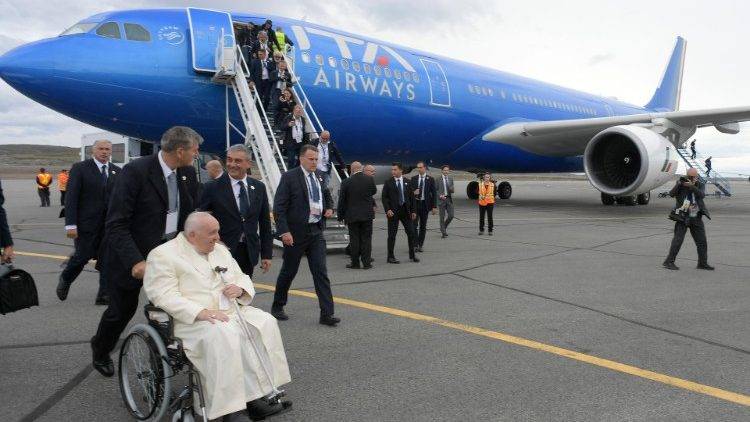Pope Francis' visit to Kazakhstan to promote dialogue, peace

The Holy See Press Office declared the details of the schedule of the 38th Apostolic Journey of Pope Francis to Kazakhstan on September 13.
Kazakhstan is a transcontinental landlocked country located primarily in Central Asia and partially in Eastern Europe. It stretches westward from the Caspian Sea to the Altai Mountains on its eastern border with China and Russia.
The Pope will attend the 7th Congress of Leaders of World and Traditional Religions in Nur-Sultan, the capital of Kazakhstan. The papal journey is also to show his closeness to the country's small but fervent Catholic community.
The theme of the Congress is "The role of leaders of the world and traditional religions in the spiritual and social development of mankind in the post-pandemic period."
This year, organizers anticipate nearly 100 delegations from 60 countries, including representatives from Islam, Christianity, Judaism, Shintoism, Buddhism, Zoroastrianism, Hinduism, and other faiths.
The main aim of this papal visit to Kazakhstan is to promote interreligious dialogue and peace in the world with the help of religious leaders, says Matteo Bruni, the director of the Holy See Press Office.
At a briefing at the Holy See Press Office on September 9, Bruni presented the Pope’s 38th Apostolic Visit abroad. The Central Asian nation will be the 57th country the Holy Father has visited.
With his visit, Pope Francis followed in the footsteps of St. John Paul II, who visited Kazakhstan in 2001, shortly after the September 11 attacks on the Twin Towers and the Pentagon in the United States.
During his visit, St. John Paul II applauded the peaceful coexistence of religions and ethnicities, such as Kazakh, Russian, Ukrainian, and many others, within the country.
Kazakhstan gained its independence from the Soviet Union in 1991.
Bruni said Pope St. John Paul II is the only previous Pope to have visited Kazakhstan. He recalled the context of that visit and the Pope's message that "religions cannot be places of conflict and called for peace to reign."
This time, Pope Francis is headed to Kazakhstan specifically to attend the 7th Congress of Leaders of World and Traditional Religions, welcoming the invitations he received from civil authorities and the Church in Kazakhstan.
During the September 13–15 visit, the Pope will stay in the capital, Nur-Sultan (formerly known as Astana).
The journey's highlights will include the Pope's participation at the Congress, where he will give a discourse, pray in silence, and engage in private discussions with religious leaders, including the Grand Imam of Al Azhar, Al Tayyeb. The religious leaders are expected to issue a declaration.
The Congress dates back to 2003 and takes place every three years in the Kazakh capital. The last one was held in 2018. However, due to the pandemic, it has not taken place for the last three years.
The Pope will be joined by his usual papal entourage, which will include the Roman Curia’s Cardinal-Prefects of the Dicasteries for Interreligious Dialogue, Promoting Christian Unity, Evangelization, and Oriental Churches.
The Holy Father is expected to greet journalists on the outgoing flight to Kazakhstan and to hold his usual press conference on the return flight to Rome, as he did for his last Apostolic Journey to Canada in July.
More than 70 journalists are expected to accompany the Pope aboard the papal flight.
Kazakhstan's population is 70 percent Sunni Muslim and 26 percent Christian, primarily Russian Orthodox. -With input from Vatican News
Radio Veritas Asia (RVA), a media platform of the Catholic Church, aims to share Christ. RVA started in 1969 as a continental Catholic radio station to serve Asian countries in their respective local language, thus earning the tag “the Voice of Asian Christianity.” Responding to the emerging context, RVA embraced media platforms to connect with the global Asian audience via its 21 language websites and various social media platforms.













